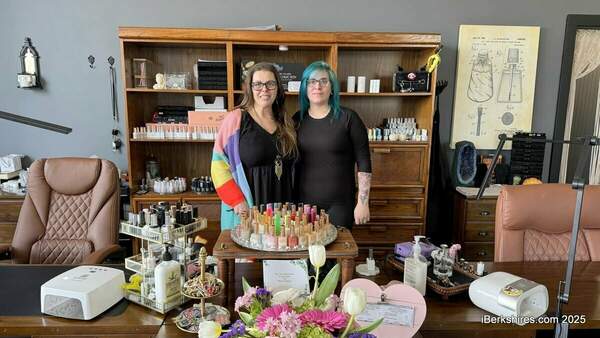
Pittsfield Solons Talk Art, Culture and Politics At Forum
 Former Berkshire Creative director and now the state's Creative Economy Industry Director Helena Fruscio, at left, attended the forum at Ferrin Gallery. |
Mayor Daniel Bianchi, state Rep. Tricia Farley-Bouvier, and Ward 6 City Councilor John Krol fielded questions on Wednesday about the role of cultural scene at a panel discussion on "Art and Community" at North Street's Ferrin Gallery. The talk was moderated by Helena Fruscio, former Berkshire Creative director recently appointed as the state's "cultural czar," and at times touched on key political issues and recent controversies.
In his first remarks, the city's new mayor was quick to dispel concerns that his administration would oppose the kind of cultural development that, as Fruscio put it, "has become a model throughout the state."
"While I was running for this office, one of my opponents' campaigns had dubbed me as the cultural Attila the Hun," said Bianchi, "While that makes a provocative image, it's ultimately inaccurate."
While Bianchi felt the main role of a mayor was to run a "safe, clean, efficient city," while attracting new business, he acknowledged that "a community that embraces the arts is one that's going to be attractive," to such enterprises.
Krol, who also participated in the downtown cultural push of recent years as the city's public affairs coordinator and as host of the "Good Morning Pittsfield" radio talk show, talked about obstacles overcome in making Pittsfield a more culture-savvy city.
"It didn't just happen. It was really hard work," he said. "When we decided to put a $1 million to make the Colonial Theatre happen, that was a good decision. We invested a half-million dollars in Barrington Stage Company, and ultimately a loan for the Beacon Cinema. Those were decisions where each one became easier after we made the first hard one. The first hard one, of course, was the Colonial."
Krol's specific endorsement of the Colonial Theatre allocation highlighted one of the most politically contested issues in the history of Pittsfield's cultural growth in the past decade. Bianchi, while a councilor, voted in favor of both the Barrington Stage and Beacon Cinema, but opposed the $1 million funding to the Colonial. Krol, who first took office in 2010, was not on the council at the time these measures were approved.
As Berkshire County's most junior state legislator, newly elected Farley-Bouvier said she has spent a lot of her first few weeks in office meeting with groups and individuals, including those in the cultural sector, to hear their concerns. She urged members of the arts community to take charge of advocating for their issues and educating their elected representatives.
"Teaching your elected officials about your issues, and your needs is critical," said Farley-Bouvier. "Don't underestimate how effective you can be."
"Come to me with information, and teach me about what you do," the legislator told the 40 or so attendees, representing a multitude of different interests in the local cultural economy. "Be organized, and advocate. When it comes times for funding for issues, don't sit back and think someone else is going to do it for you. Be aggressive."
A discussion of cultural and city planning in other Northeastern cities meandered through other recent hot-button issues in local government, including Pittsfield's ongoing parking issues, PEDA, and methadone clinics.
Krol, in particular, pointed to the city of Saratoga, N.Y., as an example of solid modern city planning, and referenced his own proposal to prohibit methadone and Suboxone clinics in the downtown area as the type of measures of foresight that yielded successful downtown revitalization.
The councilor also briefly mentioned the Pittsfield Economic Development Authority, whose proposed plan to introduce retail into the former General Electric industrial properties has met fire recently, "planning, and sometimes patience, are critical."
When asked to pick their favorite cultural institution, the officials picked a trio that covered a range of the new enterprises and initiatives that have sprung up in the city over the past six years.
Bianchi, who said he "wrestled with a lot of the initiatives," the city funded, pointed to Barrington Stage Company as a particular success story, in part because of its youth mentoring program. When approving the half-million for BSC on the City Council, Bianchi said he pressed director Julianne Boyd at the time for a commitment to help disadvantaged youth.
 "We've got challenges that other communities around us don't have," he said, and that Boyd "performed above and beyond" in responding to this need with the current youth programs.
"We've got challenges that other communities around us don't have," he said, and that Boyd "performed above and beyond" in responding to this need with the current youth programs.Farley-Bouvier chose 3rd Thursday as her favorite new development.
"It brings everyone together," she said, including the city's youth, and many families that would not ordinarily consider themselves part of the "arts and culture crowd."
Krol gave the nod to downtown nightspot Mission Bar and Tapas, which opened in 2008 and has since spawned a vastly increased local music and literary performance scene around it's activities there and in other venues. Krol cited Mission as a focal point for "the kind of youthful energy that we need... the more that we can drive that sort of idea, I'm in favor of that."
The "Art and Community" discussion was one of three hosted this week as part of the ongoing Tricks of the Trade series. Tricks of the Trade is a professional development series for artists and creatives who are looking to build a career and engage with the community, developed by MCLA’s Berkshire Cultural Resource Center in partnership with IS 183 Art School in Stockbridge and Ferrin Gallery in Pittsfield.
Tags: creative economy, cultural economy, forums, MCLA,
















